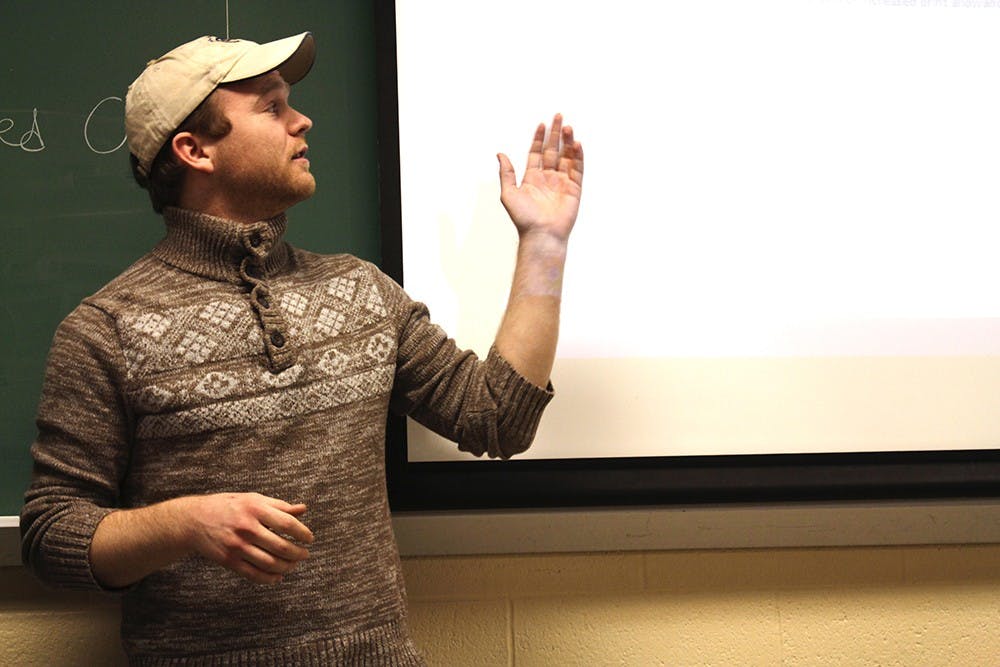Congressional representatives passed six bills during their last voting meeting of the semester at 7 p.m. Tuesday. Among the resolutions was a previously-considered resolution condemning anti-Semitism, which was initially debated and tabled at their meeting Oct. 27.
The bill stated IUSA denounces anti-Semitism as defined by the United States State Department and will not fund or participate in activities that promote anti-Semitism or that “undermine the right of the Jewish people to self-determination.” It also says IUSA executives and Congress members will undergo some form of diversity training that pertains to anti-Semitism.
Jason Shader Smith, representing off-campus residency, sponsored the bill, but it was largely written by Rebekah Molasky, a student who transferred to IU-Bloomington after feeling uncomfortable talking about being Jewish at a school in the South. She is a fellow with StandWithUs, an Israel education organization.
“Coming here and being overwhelmingly welcomed by the Jewish community ... I just wanted to do something that would give back to the community that has given me so much,” Molasky said. “I really want to thank IUSA for ... being really good allies to the Jewish communities and taking a stand.”
The bill’s authors revised the resolution’s language to address concerns about how the bill might limit free speech against Israel politically as well as whether IUSA was condemning the Boycott, Divest and Sanction movement.
BDS is a controversial movement whose supporters want to pressure Israel into ending occupation of Palestine, among other goals. However, the movement is considered anti-Semitic by some entities.
The revised version of the IUSA resolution says the bill does not disallow political criticism of Israel and IUSA is against the political platform of BDS, not against individuals who support BDS.
“After the past month of healthy debate and working with people ... we made this bill better for our IU community,” Shader Smith said.
Another resolution passed asks the Office of the Vice Provost of Undergraduate Education to research the possibility of starting a program connecting international students at IU with Bloomington residents.
The resolution referenced the International Friendship Program at Purdue University.
The premise of creating a program like the International Friendship Program is to provide support for international students, said Nate Meyers, representative for off-campus residency and primary author of the resolution.
The resolution stated there would be no legal, financial or housing commitment on the part of Bloomington residents but rather asks just for them to interact with the students.
Suggested activities included sharing holiday meals or attending sporting events together.
The resolution also said the program would be voluntary for both the residents and international students.
Helen Woeste, representing off-campus residency, said her family participates in the International Friendship program in West Lafayette, Indiana, and advocated for the bill.
“This is a really great program and everyone I’ve talked to has been extremely supportive of it,” Woeste said.
Two other resolutions dealt with sustainability. Resolutions advocating the same measures were passed last year, but since no actions have been taken to implement the requests, new resolutions were written, said Allison Larmann, member of the Environmental Affairs committee.
One resolution asked for IU-Bloomington printers’ default settings to be changed to double-sided printing in order to save paper.
The other resolution asks for IU-Bloomington to use recycled paper in their printers.
Updates to several sections of the election code were passed in another resolution, including a clarification on campaign spending after expenditure issues caused election disputes last year.
The election code now states that the total expenditures of a given campaign will be determined by assessing the fair market value of its individual expenditures, not determined by the dollar amount a ticket spent on their campaign.
This means even if t-shirts are donated to a campaign at no charge, for example, the fair market value of the shirts will be assessed and included in the total expenditures for a ticket, even though no money was actually spent on the t-shirts.
The total amount a ticket can spend on its campaign was also increased from $3000 to $4000. Head of the Election Commission Adam Kehoe said this is to adjust for inflation since the last time the limit was set.
The final resolution passed resolved that online course evaluations should include a question about how much students spent on course materials.
The information would be available on the OCQ Student Dashboard, which is a new online resource that functions similarly to ratemyprofessor.com.
“This is kind of an idea that would ... help students know what they’re getting into,” said Naomi Kellogg, representing the greek extension.






